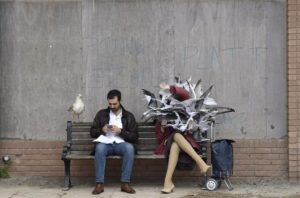Congratulations!
Thanks to COVID, you are now battle-hardened, second-semester first-year students. I would like to give you advice anyway. Your remaining three years at Notre Dame will slip away quickly and, before you notice, you will be battle-weary employees, laboring in musty cubicles, and wishing you could find a spare moment to read the Brothers Karamazov.
Allow me to share some words about my teaching philosophy. These are based upon both my experience as an educator and what I have learned as a Notre Dame parent. In other words, I know something about your ways and practices.
These are based upon both my experience as an educator and what I have learned as a Notre Dame parent. In other words, I know something about your ways and practices.
First, I am glad you are intelligent and talented. Yet as you have already found, everybody around you is intelligent and talented, too. Your challenge, to which I hope to make a contribution, is to be interesting. This means that you must acquire the tools, the wisdom, and the passion to make people care about who you are and what you will become.
Second, I am not interested in conventional definitions of what it means to be educated. In my courses, I emphasize analysis and understanding. If you can’t analyze and understand, you won’t be able to persuade. If you can’t persuade, we will have failed you.
Third, why Notre Dame? Ask yourself why you chose Notre Dame over other institutions, such as The Ohio State University (a.k.a., “The”), the Leland Stanford Junior University, and various East-coast finishing schools. Did it matter to you that Notre Dame is a Catholic university? In our time of political, moral, and epistemological crisis, our university’s distinctive character should matter in some significant way.
Finally, to quote a prominent contemporary philosopher, “along with great privilege comes great responsibility.” University education is a privilege that few people in the world experience. Who knows why you and I have been given the blessing of leisure time to cultivate our minds? We did not do anything to earn this blessing. For this reason, I believe we are morally obliged to make the most of this gift. As the Bible says: “No one, when he has lit a lamp, puts it in a cellar or under a basket, but on a stand, that those who come in may see the light” (Luke 11:33).
I have designed this entire class to persuade you to reflect on these challenges. If you feel that you have given deep thought to these issues by the end of the semester, I shall be pleased.
My office hours are on Wednesdays from 1:30-4:30. Until we gain control of the Coronavirus pandemic, I will reluctantly hold office hours over Zoom. You do not need a specific reason to visit me. By nature, I’m always curious about what’s on your mind. My email: amcadams@nd.edu
Again, I am glad you are in my class.
